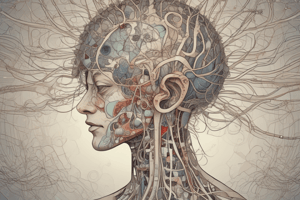Podcast
Questions and Answers
What is a common risk factor for seizures?
What is a common risk factor for seizures?
- Fever (correct)
- Generalized weakness
- Decreased consciousness
- Muscle soreness
Which type of seizure often involves stiffening or rigidity of muscles?
Which type of seizure often involves stiffening or rigidity of muscles?
- Myoclonic seizure
- Absence seizure
- Atonic seizure
- Tonic-clonic seizure (correct)
What is a distinguishing feature of the postictal stage of a seizure event?
What is a distinguishing feature of the postictal stage of a seizure event?
- Reduced muscle soreness
- Confusion (correct)
- Increased alertness
- Memory enhancement
How do partial seizures differ from generalized seizures?
How do partial seizures differ from generalized seizures?
Which diagnostic test is commonly used for investigating underlying causes of seizures?
Which diagnostic test is commonly used for investigating underlying causes of seizures?
What is a crucial long-term management strategy for preventing seizure activity?
What is a crucial long-term management strategy for preventing seizure activity?
What are common anticonvulsants used for seizures?
What are common anticonvulsants used for seizures?
During a seizure event, what should you NOT do?
During a seizure event, what should you NOT do?
What is the age range within which the onset of Multiple Sclerosis (MS) usually occurs?
What is the age range within which the onset of Multiple Sclerosis (MS) usually occurs?
Which gender is more affected by Multiple Sclerosis (MS)?
Which gender is more affected by Multiple Sclerosis (MS)?
What should be done during the postictal phase following a seizure?
What should be done during the postictal phase following a seizure?
What is a characteristic symptom of Multiple Sclerosis (MS)?
What is a characteristic symptom of Multiple Sclerosis (MS)?
Which symptom is commonly associated with multiple sclerosis?
Which symptom is commonly associated with multiple sclerosis?
What sign is described as electric-shock sensations with certain neck movements in multiple sclerosis?
What sign is described as electric-shock sensations with certain neck movements in multiple sclerosis?
Which symptom is NOT typically associated with multiple sclerosis?
Which symptom is NOT typically associated with multiple sclerosis?
What is a common diagnostic test used to detect demyelination in multiple sclerosis?
What is a common diagnostic test used to detect demyelination in multiple sclerosis?
Which medication is commonly used for managing neuropathic pain in multiple sclerosis?
Which medication is commonly used for managing neuropathic pain in multiple sclerosis?
What is the main goal of interdisciplinary care for multiple sclerosis patients?
What is the main goal of interdisciplinary care for multiple sclerosis patients?
Which symptom is a common manifestation of Parkinson's disease according to the text?
Which symptom is a common manifestation of Parkinson's disease according to the text?
What is a psychological effect commonly associated with Parkinson's disease?
What is a psychological effect commonly associated with Parkinson's disease?
Which surgical intervention is mentioned in the text as a treatment option for Parkinson's disease?
Which surgical intervention is mentioned in the text as a treatment option for Parkinson's disease?
What is the main neurotransmitter affected in Myasthenia Gravis as described in the text?
What is the main neurotransmitter affected in Myasthenia Gravis as described in the text?
Which symptom characterizes Myasthenia Gravis based on the text?
Which symptom characterizes Myasthenia Gravis based on the text?
TRUE or FALSE: Levodopa is used in the treatment of Myasthenia Gravis.
TRUE or FALSE: Levodopa is used in the treatment of Myasthenia Gravis.
What is a common early symptom of the condition discussed in the text?
What is a common early symptom of the condition discussed in the text?
What is a psychological effect mentioned in the text as part of the clinical manifestations?
What is a psychological effect mentioned in the text as part of the clinical manifestations?
Which diagnostic test is used for differential diagnosis according to the text?
Which diagnostic test is used for differential diagnosis according to the text?
What does Ritutek do in the treatment of the condition discussed in the text?
What does Ritutek do in the treatment of the condition discussed in the text?
What is an example of a nursing consideration related to the condition?
What is an example of a nursing consideration related to the condition?
What can OT (Occupational Therapy) assist with according to the text?
What can OT (Occupational Therapy) assist with according to the text?
Flashcards are hidden until you start studying
Study Notes
Clinical Manifestations of ALS
- Progressive symptomology that will progress to affect generalized muscle activity/movement, speech, swallowing, breathing
- Impaired/absent mobility, worsening dysphasia, dysphagia, dysarthria, and airway insufficiency
- Impaired mood and cognition, including labile affect, depression, anger, and grief
Diagnostics and Interventions for ALS
- Differential diagnosis using electromyography (EMG) and nerve conduction studies to rule out other causes of musculoskeletal dysfunction
- Interdisciplinary care including occupational therapy, drug therapies, and nursing considerations for alternative communication needs, impaired airway clearance, fall risk, aspiration risk, impaired mobility, depression, and risk for respiratory insufficiency
Clinical Manifestations of Multiple Sclerosis (MS)
- Progressive deterioration of the central nervous system (CNS) leading to progressive loss of cognition, sensation, and movement
- Early symptoms include diplopia, blurred vision, pain with eye movement, and unilateral loss of vision
- Common symptoms include peripheral paresis, paresthesia, and/or paralysis, electric-shock sensations, tremors, ataxia, and fatigue
- Other symptoms include slurred speech, dizziness/vertigo, neuropathic pain, problems with sexual, bowel and bladder function, tinnitus, dysphagia, dysarthria, nystagmus, brain fog, and memory deficits
- Psychological effects include labile affect, depression, anger, and grief
Diagnostics and Interventions for MS
- Differential diagnosis to rule out other causes of CNS dysfunction
- Serum tests, evoked potential tests, and MRI to detect demyelination along spine and brain
- Interdisciplinary care including drug therapy, plasmapheresis, and muscle relaxants to slow disease progression
- Goal of symptom management and slow disease progression
Clinical Manifestations of Parkinson's Disease (PD)
- Progressive, neurodegenerative disease of the CNS
- Presence of TRAP (Tremors, Rigidity, Akinesia, Postural instability)
- Early symptoms include unilateral presentation, pain, and tremors
- Common symptoms include bradykinesia, rigidity, postural instability, and resting tremors
- Other symptoms include dysphagia, dysarthria, nystagmus, brain fog, and memory deficits
- Psychological effects include labile affect, depression, anger, and grief
Diagnostics and Interventions for PD
- Differential diagnosis using anti-Parkinson's medication challenge
- Interdisciplinary care including drug therapies, surgical interventions, and psychological and social supports
- Goal of symptom control and improvement of quality of life
Clinical Manifestations of Myasthenia Gravis (MG)
- Progressive, autoimmune disease that destroys acetylcholine (ACh) receptors
- Causes miscommunication between neuro and musculoskeletal systems
- Rapid onset of voluntary muscle fatigue with use, leading to voluntary muscle weakness
- Onset typically in women under 40 years old and men over 60 years old
Seizures
- Abnormal, sudden, excessive, uncontrolled electrical discharge within brain
- Risks include metabolic disorders, fever, ETOH withdrawals, substance abuse, electrolyte imbalances, heart diseases, and decreased CO
- Stages of seizure events include aura, seizure activity, and postictal period
- Types of seizures include generalized, partial, tonic, clonic, tonic-clonic, absence, and myoclonic seizures
Long-Term Management of Seizures
- Look for signs of aura for prevention of seizure activity
- Nursing considerations and patient teaching for anticonvulsant medication therapy
Studying That Suits You
Use AI to generate personalized quizzes and flashcards to suit your learning preferences.




